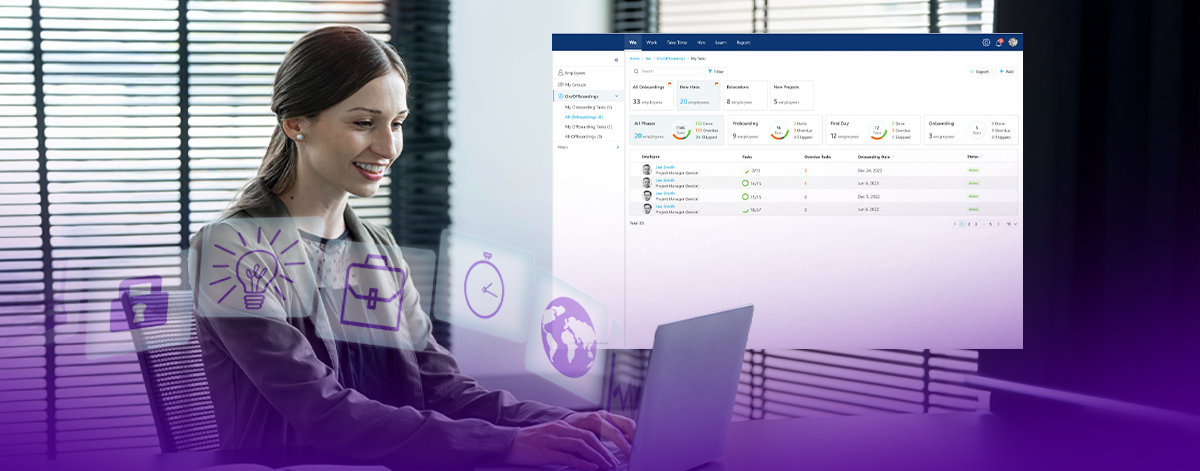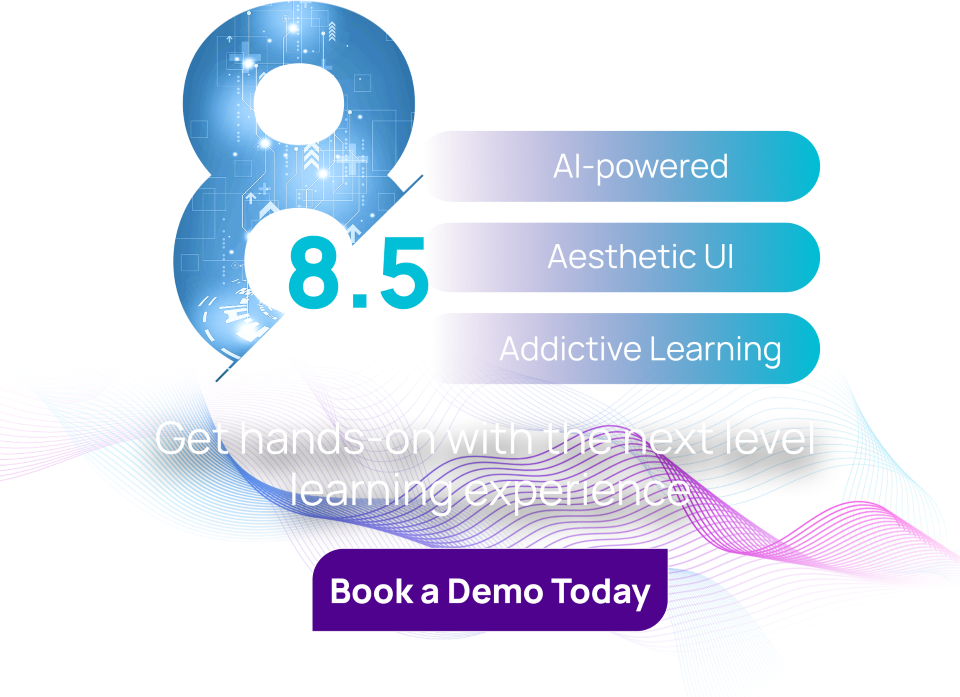
Gamified Learning Platforms: Engaging Employees Effectively
October 10, 2025
Banking LMS: Building Compliance and Customer Trust
October 10, 2025Table of contents
- The Regulatory Landscape Driving Learning in Banks: How an LMS in Banking Helps
- How a Robust LMS Empowers Banking Institutions
- Key Features of a Financial LMS for Banks
- Banking Compliance Training: The Cornerstone of Trust
- The Role of an LMS in Employee Onboarding
- How Banks Benefit Strategically from LMS Adoption
- How Tenneo Empowers Banks with Future-Ready LMS Solutions
- Building Trust and Performance with Tenneo
With increasing scrutiny from regulators, evolving financial products, and rapidly shifting customer expectations, banks face constant pressure to maintain a skilled and compliant workforce.
A Learning Management System (LMS) provides banks with a centralized platform to deliver, monitor, and optimize both compliance training and professional skill development. Beyond regulatory obligations, an LMS enables banks to cultivate a culture of continuous learning that empowers employees to adapt to innovation and complexity.
The Regulatory Landscape Driving Learning in Banks: How an LMS in Banking Helps
Regulations in banking are both extensive and dynamic. Financial institutions must comply with anti-money laundering (AML) directives, Know Your Customer (KYC) requirements, data privacy laws, cybersecurity standards, and guidelines from relevant agencies such as the Reserve Bank of India (RBI), the Federal Reserve, or the European Central Bank depending on the region. Non-compliance can result in heavy fines, reputational damage, and, in severe cases, license suspension.
A banking compliance training program delivered through a financial LMS ensures your employees:
- Stay updated with regulatory changes in real time.
- Access mandatory compliance modules tailored to their roles.
- Get assessed regularly for knowledge retention.
- Receive certifications to validate compliance readiness.
With an LMS, training records are easily auditable, enabling banks to demonstrate adherence to regulatory standards.
How a Robust LMS Empowers Banking Institutions
Implementing a strong LMS in banking is a strategic requirement for banks to safeguard compliance, upskill employees, and remain competitive. Here are the key reasons:
- Centralized Compliance Management: Banks employ thousands of employees across branches, departments, and geographies. Managing compliance training at such a scale without automation is nearly impossible. A financial LMS allows compliance officers to:
- Roll out training modules across locations instantly.
- Track completion rates and assessment scores.
- Generate compliance reports for audits at the click of a button.
This centralized system reduces administrative burdens while ensuring uniformity in training delivery.
- Continuous Skill Development: ompliance is critical but so is upskilling. Banks are undergoing digital transformation, offering services such as mobile banking, blockchain-based transactions, and AI-driven customer support. To thrive in this new landscape, employees must be skilled in digital tools, financial products, data analysis, and customer engagement.
An LMS in banking enables:
- Personalized learning paths based on roles and skills.
- Access to microlearning and just-in-time training.
- Integration of simulations and case studies for practical learning.
This ensures employees are compliant and capable of driving innovation and customer trust.
- Enhanced Employee Engagement: Bank employees often view compliance training as monotonous. A modern LMS combats this with gamification, leaderboards, and scenario-based learning. By making training interactive, banks can achieve higher levels of engagement and retention. This helps transform compliance training from a “checklist activity” to a meaningful learning experience.
- Scalability and Flexibility: Whether a bank has 500 or 50,000 employees, a cloud-based financial LMS can scale effortlessly. It supports multilingual training for global banks and offers mobile access, enabling employees to complete training on the go. This flexibility is vital in a 24/7 industry like banking.
- Cost Efficiency and ROI: With an LMS, banks reduce these costs while improving efficiency. The ROI stems from reduced training expenses as well as minimized compliance risks, improved employee productivity, and the faster onboarding of new hires.
Key Features of a Financial LMS for Banks
For an LMS to be effective in the banking sector, it must go beyond basic e-learning functionality. Below are its must-have features:
- Automated Compliance Updates – Integration with regulatory databases to keep courses aligned with new rules.
- Role-Based Learning Paths – Ensure that tellers, relationship managers, auditors, and executives receive tailored training.
- Certification Management – Tracks certification validity and renewal reminders to avoid lapses.
- Audit-Ready Reporting – Provides verifiable records for internal and external audits.
- Secure Access and Data Protection – Meets banking-grade security standards to safeguard sensitive employee and training data.
- Mobile and Microlearning Support – Ensures anytime, anywhere learning particularly important for field staff.
- Gamification & Interactive Content – Improves learning motivation and knowledge retention.
Banking Compliance Training: The Cornerstone of Trust
In banking, trust is everything. Customers entrust their finances, personal information, and future security to financial institutions. Any regulatory breach erodes this trust.
An LMS makes compliance training measurable and proactive:
- Employees receive mandatory AML/KYC modules with scenario-based exercises.
- Regular assessments highlight knowledge gaps before they can become risks.
- Managers and auditors gain transparent visibility into compliance readiness.
This ensures adherence to laws and fosters a culture of risk awareness where employees internalize the importance of compliance.
The Role of an LMS in Employee Onboarding
Onboarding in banking is complex because it requires product knowledge, compliance protocols, IT systems, and customer service skills. A bank employee learning platform powered by an LMS accelerates onboarding by:
- Delivering structured learning modules before day one.
- Providing branch-specific training for relevance.
- Offering assessments to measure readiness.
This reduces the time to productivity while ensuring every new employee starts on the proper compliance footing.
How Banks Benefit Strategically from LMS Adoption
When banks implement a robust LMS, the impact goes beyond compliance checkboxes. Strategic benefits include:
- Improved Risk Management – With employees better trained, the likelihood of compliance breaches is significantly reduced.
- Agility in Regulatory Change – Rapid updates allow banks to stay ahead of evolving legal requirements.
- Higher Customer Satisfaction – Skilled employees offer better service by resolving issues quickly and building stronger relationships.
- Talent Retention – Continuous learning opportunities boost employee satisfaction and reduce attrition.
- Future-Readiness – Banks can prepare their workforce for emerging technologies such as AI, blockchain, and digital payments.
How Tenneo Empowers Banks with Future-Ready LMS Solutions
At Tenneo, we understand that training in the banking sector is the foundation of trust, brand identity, and customer experience. Our financial LMS solutions are therefore designed to simplify compliance management while enabling banks to build an agile, skilled, and future-ready workforce.
In last 25+ years, we’ve partnered with leading banks and financial institutions to solve some of their most pressing training challenges.
One of India’s leading banks sought to consolidate its IT, digital, and training functions across its regional and subsidiary operations. They needed one unified platform to represent their brand values consistently but several obstacles stood in the way:
- No centralized access to eLearning courses.
- Compliance issues due to difficulties in tracking new hires.
- Inconsistent training delivery across departments.
- Low completion rates caused by technical and accessibility challenges.
- Manual, repetitive reporting processes delaying decisions.
Tenneo’s Solution:
We implemented a centralized, gamified, and modular LMS in banking that addressed both compliance and skill-based training needs.
Impact Achieved:
- Completion rates improved from 60% to 90%, significantly reducing compliance risks.
- 95,000 users registered for LMS usage within a short time span.
- 60% higher adoption rates compared to the previous system.
In addition to the above, training delivery became consistent across the organization, enhancing brand alignment for the client. The client also reported that their new hires achieved productivity more quickly, thereby reducing induction-to-performance timelines.
For one of India’s largest credit card companies, training their widely dispersed workforce posed a significant challenge. A large portion of their sales force was hired through third-party vendors, making it difficult to track employee numbers, training costs, and compliance requirements. Challenges included:
- Difficulty calculating costs for new hires and training logistics.
- Compliance gaps with RBI’s mandatory New Hire Orientation (NHO) guidelines.
- Lack of multilingual and mobile-first training options for field staff.
Tenneo’s Solution:
We designed and deployed a mobile-first LMS app rebranded as mGurukul that became a one-stop solution for the extended workforce. Key capabilities included:
- Seamless integration with HRMS for real-time data on new hires.
- Automatic role-based training assignments.
- Localized multilingual content to improve accessibility.
- Mobile access for learning anytime, anywhere.
- Immediate adherence to RBI’s NHO compliance requirements without delays.
Impact Achieved:
- Over 100,000+ app downloads within months of launch.
- 120% increase in sales by new joiners due to faster readiness.
- 3,000–4,000 employees trained weekly despite workforce scale.
- 108% rise in overall sales productivity compared to pre-pandemic levels.
- Induction timelines reduced by nine days, accelerating time-to-performance.
- 25,000 employees actively using the LMS daily, ensuring scalability and reach.
This transformation turned our client’s training function into a robust, digital-first system, ensuring compliance and directly boosting business outcomes.
Building Trust and Performance with Tenneo
At Tenneo, our mission is to help banks and financial service providers confidently navigate regulatory requirements while empowering their workforce to deliver superior performance.
With proven expertise in addressing challenges such as bridging compliance gaps, managing dispersed teams, and enhancing training engagement, Tenneo’s financial LMS delivers measurable results: higher adoption rates, improved compliance scores, faster onboarding, and increased employee productivity.
If you’re exploring LMS options or looking to maximize the value of your current system, contact Tenneo experts today for an in-depth consultation.





